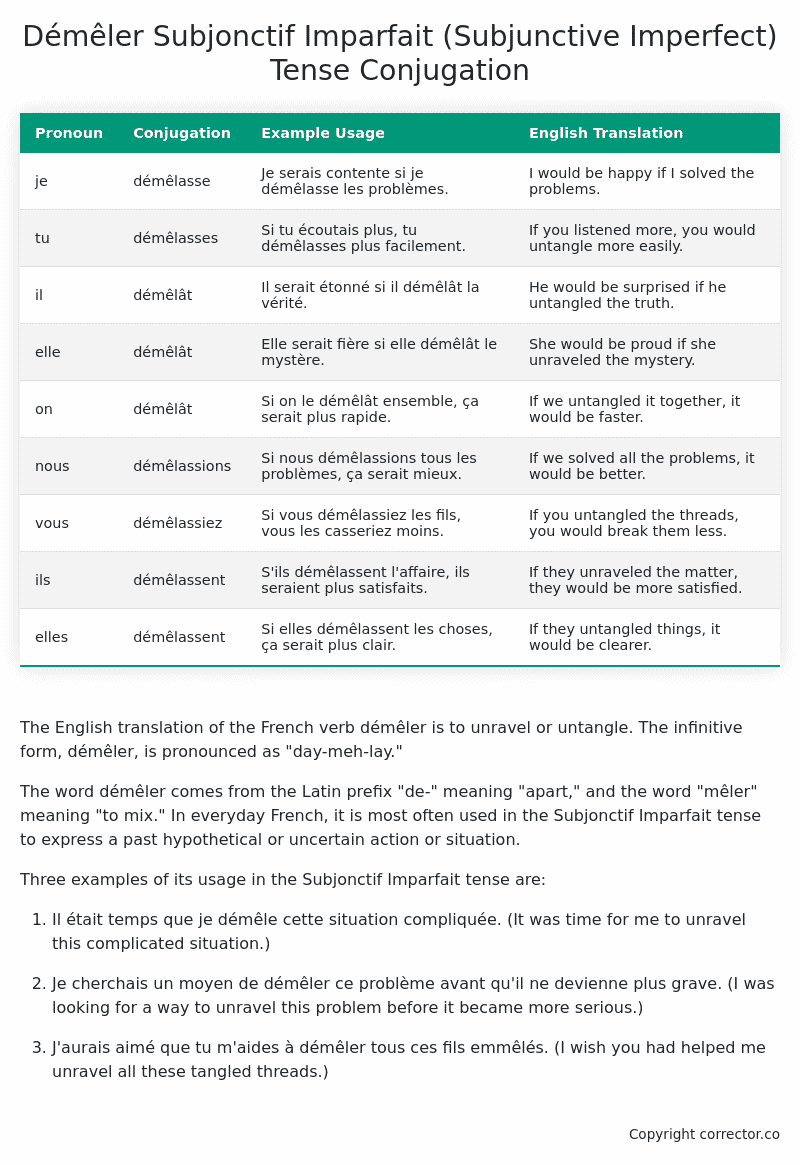Subjonctif Imparfait (Subjunctive Imperfect) Tense Conjugation of the French Verb démêler
Introduction to the verb démêler
The English translation of the French verb démêler is to unravel or untangle. The infinitive form, démêler, is pronounced as “day-meh-lay.”
The word démêler comes from the Latin prefix “de-” meaning “apart,” and the word “mêler” meaning “to mix.” In everyday French, it is most often used in the Subjonctif Imparfait tense to express a past hypothetical or uncertain action or situation.
Three examples of its usage in the Subjonctif Imparfait tense are:
-
Il était temps que je démêle cette situation compliquée. (It was time for me to unravel this complicated situation.)
-
Je cherchais un moyen de démêler ce problème avant qu’il ne devienne plus grave. (I was looking for a way to unravel this problem before it became more serious.)
-
J’aurais aimé que tu m’aides à démêler tous ces fils emmêlés. (I wish you had helped me unravel all these tangled threads.)
Table of the Subjonctif Imparfait (Subjunctive Imperfect) Tense Conjugation of démêler
| Pronoun | Conjugation | Example Usage | English Translation |
|---|---|---|---|
| je | démêlasse | Je serais contente si je démêlasse les problèmes. | I would be happy if I solved the problems. |
| tu | démêlasses | Si tu écoutais plus, tu démêlasses plus facilement. | If you listened more, you would untangle more easily. |
| il | démêlât | Il serait étonné si il démêlât la vérité. | He would be surprised if he untangled the truth. |
| elle | démêlât | Elle serait fière si elle démêlât le mystère. | She would be proud if she unraveled the mystery. |
| on | démêlât | Si on le démêlât ensemble, ça serait plus rapide. | If we untangled it together, it would be faster. |
| nous | démêlassions | Si nous démêlassions tous les problèmes, ça serait mieux. | If we solved all the problems, it would be better. |
| vous | démêlassiez | Si vous démêlassiez les fils, vous les casseriez moins. | If you untangled the threads, you would break them less. |
| ils | démêlassent | S’ils démêlassent l’affaire, ils seraient plus satisfaits. | If they unraveled the matter, they would be more satisfied. |
| elles | démêlassent | Si elles démêlassent les choses, ça serait plus clair. | If they untangled things, it would be clearer. |
Other Conjugations for Démêler.
Le Present (Present Tense) Conjugation of the French Verb démêler
Imparfait (Imperfect) Tense Conjugation of the French Verb démêler
Passé Simple (Simple Past) Tense Conjugation of the French Verb démêler
Passé Composé (Present Perfect) Tense Conjugation of the French Verb démêler
Futur Simple (Simple Future) Tense Conjugation of the French Verb démêler
Futur Proche (Near Future) Tense Conjugation of the French Verb démêler
Plus-que-parfait (Pluperfect) Tense Conjugation of the French Verb démêler
Passé Antérieur (Past Anterior) Tense Conjugation of the French Verb démêler
Futur Antérieur (Future Anterior) Tense Conjugation of the French Verb démêler
Subjonctif Présent (Subjunctive Present) Tense Conjugation of the French Verb démêler
Subjonctif Passé (Subjunctive Past) Tense Conjugation of the French Verb démêler
Subjonctif Imparfait (Subjunctive Imperfect) Tense Conjugation of the French Verb démêler (this article)
Subjonctif Plus-que-parfait (Subjunctive Pluperfect) Tense Conjugation of the French Verb démêler
Conditionnel Présent (Conditional Present) Tense Conjugation of the French Verb démêler
Conditionnel Passé (Conditional Past) Tense Conjugation of the French Verb démêler
L’impératif Présent (Imperative Present) Tense Conjugation of the French Verb démêler
L’infinitif Présent (Infinitive Present) Tense Conjugation of the French Verb démêler
Struggling with French verbs or the language in general? Why not use our free French Grammar Checker – no registration required!
Get a FREE Download Study Sheet of this Conjugation 🔥
Simply right click the image below, click “save image” and get your free reference for the démêler Subjonctif Imparfait tense conjugation!

Démêler – About the French Subjonctif Imparfait (Subjunctive Imperfect) Tense
Formation
Common Everyday Usage Patterns
Interactions with Other Tenses
Subjonctif Présent
Indicatif Passé Composé
Conditional
Conditional Perfect
Summary
I hope you enjoyed this article on the verb démêler. Still in a learning mood? Check out another TOTALLY random French verb conjugation!


